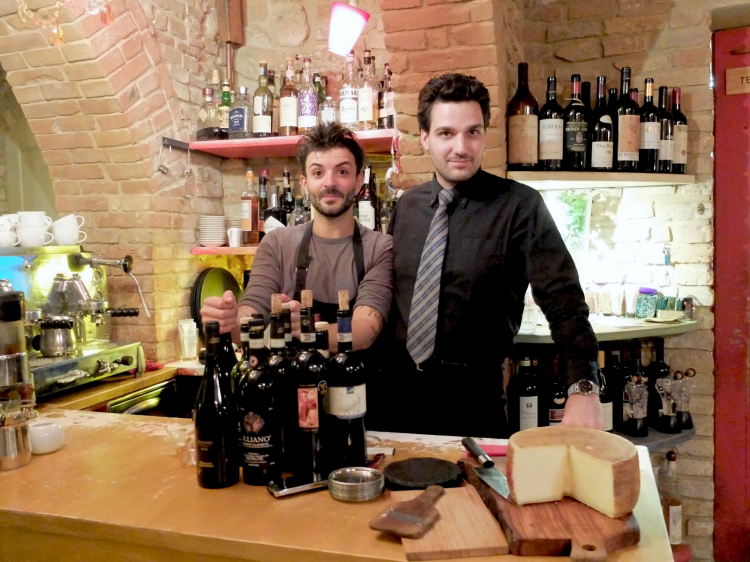«Alberto Sparacino of Cum Quibus in San Gimignano is good: he’s still little known, he’ll show his value in the next few years», said Gaetano Trovato in July, explaining his future projects (see: Papà Arnolfo cambia casa dopo 22 anni), but also mentioning some of his many pupils, the best ones. Sparacino was among them.
So we paid him a visit, right in the middle of the historic centre of San Gimignano, in one of the many cross streets along the main road. The restaurant is in a palace from the 13th century. A few steps and you’re in a Medieval style atmosphere, full of arches and stone walls, as well as colourful lights and candles. It might seem a sumptuous version of the typical Tuscan tavern, and indeed it was for a long time, since the parents of patron Lorenzo Di Paolantonio opened the restaurant in February 2005. The latter says: «I was still in high school then. My parents asked me to help them during the summer. I entered Cum Quibus». He never left. First he took care of the kitchen, then chose the dining room and cellar: «In 2004, I was 28, I thought the restaurant had to grow. I had enough of pots and pans, and looked for a good young chef...».

Alberto Sparacino with patron Lorenzo Di Paolantonio
Some shared acquaintances led him to
Alberto Sparacino, who is more or less his age: born in 1984 in Colle Val d’Elsa, the village of
Trovato’s
Arnolfo, he trained for three years there, as well as with
Daniel Boulud in Manhattan. A degree in surveying and a few exams in Engineering,
Sparacino was then running the kitchen at
Colombaio in Casole d’Elsa, after four years with
Barone Ricasoli at
Castello di Brolio. He mixed these experiences in a personal and already structured style, which overturned the previous philosophy at
Cum Quibus. Of
Trovato, for instance, one can notice the attention to defined flavours and a touch of French references – though in a Mediterranean key – which he further refined with
Boulud. However, if you ask him what’s behind his attention for sauces and bases, he says: «It’s because of
Matteo. He always said: sauces, sauces!».
The Matteo he refers to is Lorenzini, his great friend and chef at Ses.To on Arno in Florence. The two met around 2007 at Arnolfo’s, «and at the time, Simone (Cipriani, now at Essenziale, see: Il gusto di essere Essenziale) was also there». As well as another Matteo, Manzini, «impressive, he could work with two hands doing different things at the same time». And indeed he’s now sous chef at three-starred Azurmendi with Eneko Atxa, in the Basque Country. A nice brood, in other words.
Back to us: culinary speaking,
Sparacino is the result of this journey that led him to overlap three different levels. He’s very open to the world, «I enjoy travelling and learning from the culinary cultures I discover. First, the Japanese and Asian culture in general. Joining them with the Italian one. This year I began to study South American cuisine…»; there’s Italy, a point of reference that surely derives from
Trovato, but also from the life of the young chef: his father is from San Cataldo, Caltanissetta, in Sicily, his mother from Arbus, in Medio Campidano, Sardinia. There’s lots of Tuscany too, though he points out: «My cuisine is Italian, not just Tuscan». Indeed, yet he rarely renounces to the local territory, though filtered with wider influences, so that the results are rather eclectic.
His dishes, we were saying, are full, complex, sometimes even muscular: «My cuisine is fundamentally instinctive. I’m interested in flavour, but with balance. Recipes that have aromatic peaks, but I don’t want them to be excessive». They often have the harmony he’s also reached in his relationship with patron
Di Paolantonio, «especially this year». He says: «I have fun here. I’m lucky, I do what I love all day long».
Last, dutiful question to the patron: why did you take on a complex fine dining road in a context that would rather lead to simple panzanella and Florentine steaks? His answer: «San Gimignano allows you to work well, in all cases; but tourism, the constant flow of clients, shouldn’t be a limit or an excuse not to do better, but an opportunity you must make use of. I don’t think I needed courage to start this work with Alberto. We had and still have the necessary passion, and the desire to do something more». In the photo gallery by Tanio Liotta, the dishes from our dinner.
Translated into English by Slawka G. Scarso